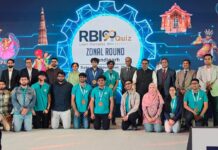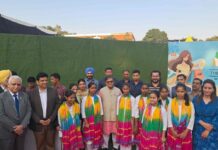Chandigarh sunita shastri:An online Capacity Building cum Training Programme “Methodology for Conduct of Skill Gap Analysis” was organized under the aegis of the Research Project TIGR2ESS, (Transforming India’s Green Revolution by Research and Empowerment for Sustainable Food Supplies), an international research project lead by the University of Cambridge, funded by Global Challenges Research Fund, U.K., in collaboration with the Department of Public Administration and University Institute of Applied Management Sciences, Panjab University under the patronage of Prof. Raj Kumar, Vice Chancellor, PU and organised by Prof. Ramanjit Kaur Johal (Principal Investigator, TIGR2ESS at PU), Dr. Monika Aggarwal & Dr. Radha Kanwal Sharma.Dr Chandan Chowdhury, Senior Associate Dean and Practice Professor, ISB, Mohali was the resource person. Dr Sandeep Singh Kaura, Advisor, Punjab Skill Development Mission and Col Rajeev Bhargava from ISB also attended the session. Dr Monika Aggarwal, Co-Investigator, TIGR2ESS, Panjab University, welcomed the guests and participants and introduced Dr. Chowdhury’s work in the area of Skill Development research.Dr Chandan Chowdhury appreciated the relevance of the project being undertaken by the Panjab University saying that skill development is particularly important in terms of realising employability and economic growth. Averring ISB’s commitment to research with rigour and relevance, going on to highlight the importance of skilling and its impact on employment generation, he explained the methodology for the conduct of skill gap studies by citing examples of two projects. He discussed the mixed methods (qualitative and quantitative) approach adopted by his team at ISB and Hero Motor Corp in developing corporate skilling strategies to enhance women’s employability through CSR programmes. This was a significant study as it was a matter of concern that female labour force participation rate in India has declined significantly in the past few decades, being lower than Western and also other Asian countries. He also discussed his study of skill gap analysis in the Indian textile industry wherein India needs to be prepared for the 4th Industrial Revolution (Industry 4.0) as the future belongs to machine only and hybrid jobs (both human and machine) and people have to be skilled accordingly. Further, industry in the post-Covid period has hastened the shift towards digitalisation leading to creation of dark industries. These industries will be 100% technology driven and sans labour force.The main topics covered were research design, research process, data collection methodologies including qualitative and quantitative tools and methods. The participants also queried about data validation methods, data analysis softwares and conducting focused group discussion with key stakeholders. Dr Chowdhary emphasised the importance of defining the problem accurately; using a mixed approach of using both quantitative and qualitative methods for data collection, focus on skills required at local level, migration trends and understanding youth aspirations.
Prof Ramanjit Kaur Johal, Principal Investigator, TIGR2ESS, Panjab University emphasised the role of the project in effecting wellbeing in rural areas through skill development and improved nutrition. Skill gap analysis in two districts of Punjab was going to be undertaken soon and this session was a precursor to finalising the design of the study. She appreciated the contribution of this session to building research capacity among the young researchers of the University, an important deliverable of the TIGR2ESS Project. 40 faculty members and research fellows attended the capacity building programme.
















